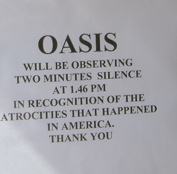We are developing the social individualist meta-context for the future. From the very serious to the extremely frivolous... lets see what is on the mind of the Samizdata people.
Samizdata, derived from Samizdat /n. - a system of clandestine publication of banned literature in the USSR [Russ.,= self-publishing house]
|
When looking at the world around us, it is impossible to constantly take everything upon which we must form an opinion back to first principles: life is simply too short for that.
But to decide if a dog might be about to bite you, one must have at least some understanding of the nature of dogs and how they might act differently to cats or parrots or foxes or hippopotamuses (the later being a rare sight in London it must be noted). Whilst the propensity of a Golden Labrador and a Staffordshire Bull Terrier to chomp on you varies considerably, both are nevertheless dogs and thus act within the range of doglike behaviours to which their natures impel them.
And so to understand anything done by a state, the workings of its parts and how they are likely to impact upon your life, one must understand some of the basic underlying truth about the nature of states. All states are not exactly the same just as all dogs are not exactly the same: whilst a libertarian such as myself might lambast the United States or the United Kingdom for many and varied sins, it is clear to all but the ‘rationality impaired’ that the USA and UK are currently significantly less harmful to their subjects than the likes of Iraq or Myanmar or China or Belarus or Zimbabwe.
So when I recently wrote a couple articles about posters by a government body (Transport for London) aimed at garnering public support for increasingly panoptic mass surveillance, some commenters (a minority it must be said) took exception to the idea there might be anything sinister about the vast proliferation of CCTV cameras in Britain to which the state has access. Britain after all, is not Nazi Germany or North Korea, so what is the problem?

Trust us. Constantly. The second you step out of your front door. Nevertheless, all states, like all dogs, do indeed share some common irreducible aspects to their natures. Without getting into the intractable and interminable minarchist versus anarchist inter-libertarian debates of the legitimacy of any form of state, it is fair to say all modern states however democratic and ‘liberal’ suffer from a type of progressive moral cirrhosis. Take the remarks in the Telegraph regarding Britain’s socialist National Health Service:
Rather as in the old Soviet Union, many managers now think it safer to fiddle their returns rather than send bad news back to the centre. This week, for instance, the Department of Health claimed that no one now has to wait more than 24 hours in accident and emergency, a claim that was flatly contradicted by the BMA [British Medical Association]. It has got to the point where we now routinely expect schools to massage their test results and hospital managers to fiddle their waiting lists. No wonder people’s everyday experience of schools and hospitals so rarely seems to accord with the glowing reports presented by the Prime Minister and his colleagues in the House of Commons.
Yet Britain is not the Soviet Union and although it does imprison the most number of people per capita in Europe, there is no network of gulags or mass murders to enforce the governing party’s supremacy. Unlike Saddam Hussain, who holds sham elections in which 100 percent (‘if not more’) vote for him, in the democratic western world, elections are free and fair. Well, sort of. They just gerrymander the way people vote. Of course this is not the same as what Saddam Hussain does but it is certainly the same species of behaviour.

Democracy, Iraqi style: happiness is mandatory

Democracy, American style: representing who exactly?

Democracy, British style: looking after you, like it or not.
(Photo: Mike Scott) So why, given that we are constantly told how superior democratic states are to their benighted totalitarian counterparts, do we see time and time again the same toxic behavioral characteristics, albeit manifested in less homicidal ways?
It is because all modern states exist primarily to do things. By this I mean do more than just guard the boundaries of society (i.e. keep out marauding Turks, put out fires, run law courts). All states have always done things, such as waged wars, built aqueducts or whatever, but not all states have existed to primarily do things beyond aggrandise the King/Tzar/Chief/Khan/Sultan etc… stay out of the state’s way and it tended to leave you alone. That did not mean that such states were not capable of acts of breathtaking tyranny, just that unlike an overtly interventionist state such as we all live under these days, to a large extent the pattern of your life was social rather than political: if your children were schooled, it was because that was the custom and it seemed the thing to do, rather than because the state threatened you with arrest if you did not acquiesce to your children being conscripted for mandatory collective education.
Much like dogs, some states are more vicious than others but ultimately the people who grasp the levers of power do so in the knowledge that they are there to do things and that knowledge alone is the source of their inevitable corruption by the system they are part of. That is why in the long run it does not matter which state wants to envelop their subjects in panoptic surveillance, because in the end no state can be trusted to have such information at its casual disposal because states cannot be trusted to act other than as states, and all states are to a lesser or greater extent corrupt. It is the nature of the beast.
Across London, these posters can be seen telling us all that we are ‘Secure beneath The Watchful Eyes’ of the Metropolitan Police. I cannot tell you how much better that makes me feel. The imagery is pure 1930’s/1940’s and conjurors up the ‘Golden Age of Totalitarianism’.
Britain is already a Police State in so far as the means for total repression are already well and truly in place. As the poster indicates all too well, Britain is the nation most under surveillance on Earth, Echelon monitors our domestic communications, our Internet usage is logged for years due to the Draconian RIP Act, our locations detected via our mobile phones and logged, all for the apparatus of state to access on very low level authority. Civilians are not just deprived of any firearms, in reality we are forbidden to defend ourselves and our property with so much as a broom stick. Our right to trial by Jury faces abridgement, even our ancient protection of Habeas Corpus is now a dead letter under European extradition laws.
Yes, we still have a fairly free press, in so far as the media are strong enough to prevent restrictions against their actions… yet do not dare to make an allegedly ‘racist’ remark or pour scorn on someone’s religion or make a joke about Wales: if you do then expect to find yourself up in front of the Beak justifying yourself under threat of fine or gaol, and forget saying “I was just exercising my right to freedom of speech”.
Is it any surprise that the powers that be feel they can dare put posters announcing that you are ‘Secure beneath The Watchful Eyes’. Secure? From what? Surveillance increases daily at the same times as crime soars out of control, so if we are not ‘secure’ from crime, then what exactly is being secured? We face many threats in the modern world but the biggest comes from the people who would watch our every action so that the State may choose to judge us when it sees fit.

How long before we start seeing this poster?
Update: See follow up articles to this one on Samizdata.net here and here
Part II of III
What would be the requirements of a libertarian just war? Libertarianism permits the killing of another if it is an act of reasonable self-defence. Nothing in libertarianism precludes the possibility of a collectively exercised right to self-defence. This has been accepted by most libertarians as one of the few valid functions of a ‘night-watchman’ state. As long as every individual in a society agreed to be defended by a state and the state acted against only those individuals who were actual aggressors, e.g. an invading army, on what grounds could a libertarian object?
Given that it is not practically possible to fulfil the above conditions, especially the first one, it seems to me that many of those who engage in the debate about war on Iraq for genuine and morally inspired reasons are trying to choose between two evils. Their side in the debate usually depends on which of the two evils seems more morally unacceptable to them. There are also those who find it impossible to choose, their instincts oscillating between the need for self-defence and protection, and fear of compromising their fundamental principles by condoning killing of innocent civilians. One of those is Chris Newman whose comment captures the agony of such moral choice.
The statement ‘as long as harming innocents is not the objective, if a given use of force is justified then innocent bystanders are often just a regrettable consequence’ is based on the acceptance of the doctrine of double effect. It is a useful rule, often used in moral dilemmas that can be summed up as “damned if you do, damned if you don’t”. An act with both good and bad effects is morally permissible if and only if the following conditions are all met:
- The action itself is not forbidden by a moral rule.
- Only the good effect is intended.
- The bad effect is proportional to the good.
- The bad effect is not a direct means to the good effect (e.g. bombing cities to demoralise a population and hence hasten a war’s end).
And since Michael Walzer’s influential book Just and Unjust Wars (1971), in the context of war it is common to see added the following condition:
- Actions are taken to minimise the foreseeable bad effects, even if this means accepting an increased risk to one’s own combatants (e.g. one’s own soldiers)
In modern warfare the principle of the double effect is frequently applicable. In waging a just war a nation may launch an air attack on an important military objective of the enemy even though a comparatively small number of non-combatants are killed. This evil effect can be compensated for by the great benefit gained through the destruction of the target. This would not be true if the number of non-combatants slain in the attack were out of proportion to the benefits gained, as is clear from the fourth condition. Furthermore, if the direct purpose of the attack were to kill a large number of non-combatants, so that the morale of the enemy would be broken down and they would sue for peace, the attack would be immoral because the third condition for the lawful use of the principle would not be fulfilled. It would be a case of the use of a bad means to obtain a good end.
Chris Newman takes a similar route but ends up with a different point and in the utilitarian camp:
“…our moral calculus has at least three variables: the importance of the objective, the efficacy of a given type of force in achieving that objective, and the cost in innocent lives of using that type of force. Presumably, for any given values of the first two variables, there will be a point at which the value of the third becomes too high, so that the action cannot be justified…”
There appears to be a conflict between a moral justification for waging a just war and a strategic aspect of it. But does exploiting the advantage of superior military capabilities amount to using incommensurate or disproportionate force? It doesn’t because force is defined by effect on the enemy including the civilians, not by the amount of firepower. You can use superior fighting force and technology in order to shorten the war and ensure you destroy enemy fighting forces rather than civilians. → Continue reading: Just war and libertarians
Part I of III
Arguments over war in Iraq and its justification, recently fuelled by emotions running high over the first anniversary of the Sept 11th attacks, have been plaguing the libertarian camp. Samizdata decided to summarise its contributors’ positions on war in general and Iraq in particular and received some interesting responses. There are many strands of arguments for and against war on Iraq and it is impossible to even mention them all in one posting. There are several interesting points I wish to add to or stress in the debate.
One of the objections to Perry’s position on the destruction of tyranny and libertarian opposition to it comes from Julian Morrison (a comment on the above linked article):
There are many ways and means of destroying tyranny, but the only ones that are “libertarianly correct” are those which do not involve harm to innocents. Assassination is far preferable, for example, to war – and hand-to-hand war is preferable to blanket bombing. There exists no right to murder, regardless of how convenient it might be.
Here justification of war is reduced to the effects it may have on the civilian population or innocents. This makes opposition to tyranny impossible. For example, makes it impossible to fight anybody ruthless enough to use human hostages.
Ignoring for a moment the other important conditions of just war, which I will deal with in Part II, I want to look at Nazism and communism as examples of historical tyrannies that were accepted as evil to be justifiably eliminated. Opposing Nazism by force was justified as self-defence and the war against Hitler and Germany has been accepted as a just war. The WWII experience proves appeasement wrong on both grounds – moral (fails in self-defence) as well as strategic or practical (gives the enemy opportunity to accumulate weapons and pose a greater threat).
Although during WWII the distinction between a dictator and the nation he lead was blurred, the Cold War made abundantly clear that there is a difference between a dictator waging a war with the country behind him and a dictator with the civilian population being at his mercy and under the same threat as his opponents.
Perry mentions Czechoslovakia as a case in point and I will merely add to his voice. During 1968 Prague Spring civil resistance the Warsaw pact used military threat on the civilian population and in the early days of the Velvet Revolution of 1989 there was in our minds a real threat that the communist government would use the army on the demonstrators. How could an attack by the West make the situation any worse in a country where the state is ready to use ‘military force’ (not just law enforcement) on its citizens? Whether I die being run over by a T-55, shot by AK-47 or by a stray ‘Western’ bomb does not make much difference to me as an individual in such situation. In fact, young and idealistic as I was in those days, I’d probably prefer the latter, given that being killed during a ‘Western liberation’ would at least serve a purpose I agreed with, whereas being killed by communists wouldn’t.
We know Saddam has used military force and chemical weapons on Kurds and will not hesitate to use such force again… Those who oppose war on Iraq on ‘moral grounds’ will find it hard to wriggle out of agreeing that it was right for the West to fight Nazism and wrong to leave the nations of Eastern Europe under communism. The problem is that Nazism and communism are obviously wrong ex-post and the current debate is about determining the moral and strategic position ex-ante.
To be continued…
Doctrine of Just war and libertarians (Part II)
Strategic considerations for attack on Iraq (Part III)
Pubs, ladies fashion stores, restaurants, banks, cafes, mobile phone stores, boutiques, gift shops…
If you are looking for the real England, you will not find it in the pages of the Guardian, but rather on the high streets and in the shop windows.
I have just got back from lunch and what I saw on the King’s Road in Chelsea, here in London, amazed me. There is no law requiring it, no government departments ‘encouraging’ it loudly, yet shop after shop are displaying signs saying words to the effects of “At 1:46 pm to day, we will be observing two minutes silence in remembrance of the atrocities on September 11th of last year in the United States.” Others are expressing memorial sentiments, still others just displaying small American flags. No doubt these signs will all be gone by this evening, but they are there now.
Some signs are hand written by shop managers, others were clearly printed by a head office… but the signs are there and they come not from above, passed down from the salons of the chattering classes, but from below, from the true heart of England.
There is indeed an Anglosphere and it is very, very real.
“Good evening, this is the news from the BBC. Peace Activists are still besieging the Saudi Arabian embassy in London to protest at Saudi Arabian funding of violent terrorist organisations and aggressively exporting Wahhabist Islam. Although there are no reports of any violence, the activists have been handing out sample bottles of Vodka and girlie magazines to passers-by as a symbol of their disapproval of the Saudi regime.
A spokesperson for the activists said that the American military campaign will not stop until the root causes of American anger had been addressed.

Root causes of American anger Meanwhile at a meeting of European Heads of State in Strasbourg, Jacques Chirac and Gerhard Schroeder issued a joint statement again condemning Al-Qaeda as a gang of ruthless savages and a threat to the entire civilised world. They also issued a warning to Saddam Hussein not to indulge in any aggressive, unilateralist behaviour that would lead to more conflict and cause even more anger in the West. Monsieur Chirac was particularly forthcoming, describing the Iraqi regime as ‘simplistic bedouin warriors’. His words were warmly welcomed by Church leaders and trade union representatives. Now over to Caroline for the weather…”
The British news media are harumphing about Tony Blair being publicly upbraided by a pair of African autocrats, overshadowing the British Prime Minister’s ‘passionate’ calls for African development and increased ‘aid’ to Africa by the West.
But therein lies part of the problem. The media seems shocked that a bunch of brutal tyrants are actually sounding like, well, tyrants… ungrateful tyrants at that.
Yet the very existence of thugs like Mugabe is underwritten by Britain (to media applause) to the tune of a billion pounds a year, stolen from UK taxpayers by the British state and given to African countries, or more accurately the ruling elites of African countries. This sort of behaviour is tantamount to Britain circa 1938 offering to give British tax money to common Germans (to be disbursed by the Nazi state or pro-Nazi NGOs) and thereby relieving the German National Socialist Workers Party’s leaders of the political consequences of their own economic policies, in effect subsidising the induced cost of fascist economics.
Tony Blair and the host of other national and NGO Tranzi cheerleaders are nothing less than the logistic support system for tyranny in the ‘Third World’.
So when you read of calls for an ‘answer’ to Mugabe, please realise that the even the most sound replies to the rhetoric on offer still skirts around the real truth. The only reply to the likes of Robert Mugabe is to meet violence with violence. If just 10 percent of that aid budget was spent sending arms to Robert Mugabe’s political enemies, including the white farmers of Zimbabwe, Mugabe and his supporters would be doing the only thing they can do by way of suitable recompense to the soil of Zimbabwe’s ruined farmlands.
Of course for this to happen would require an understanding by Blair et al of their indictable role in Africa’s ruin. The effects of the legacy of British and European colonialism pales in comparison to the here-and-now effects of Western statist support for homegrown African statism.
The always interesting Brendan O’Neill has written an article called Why I hate slackers. As is often the case, I see things rather differently:
As always the 1960s has a lot to answer for. The hippies of the anti-Vietnam War brigade were the original slacker generation. There were no doubt some positive elements in the opposition to the Vietnam War – there were some anti-imperialists in there, who were keen to kick interfering America in the teeth and to defend independence and democracy in Vietnam.
I am anti-imperialist because I do not think it is right to impose non-consensual force backed rule on other people at bayonet point. That is also why I am anti-communist, anti-fascist, anti-socialist, anti-statist conservative, anti-democratic (at least in the sense Brendan uses the word) and above all, anti-political. All these things are based on intermediation-by-force.
Today, such slackerdom is writ large across society. Today’s privileged youth don’t seem to believe in anything very much. Among the young, membership of political parties is breathtakingly low
The very essence of modern democratic politics is that it is okay to collectively use the state to by-pass normal contractual relationships between individuals and redistribute wealth in certain ways, which is a euphemism for forcibly stealing private property. That so few people should join political parties is a sign of the incremental de-legitimisation of this entire process. Splendid!
very few teenagers and twentysomethings, in both America and Britain, are signing up for the military; even in the private sphere, young people are staying at the parental home for longer and are putting off getting married and having children until much later in life, if not altogether.
In reality, this is just a return to the historical norm: prior to World War II, except during major wars themselves, both Britain and the USA maintained small non-conscript professional militaries. The large peacetime militaries of the cold war era were aberrations. As for living at home, this is largely a function of caring statists ‘helping’ the housing market with rent controls that are a dis-incentivization to rent out properties in the first place, planning regulations that discourage new building, high levels of taxation etc.
As for not having children, exactly what is so bad about that? Women are not baby factories and actually want more from life than just to reproduce. Having children is a choice, not an obligation.
Some might see these as positive developments – as signs that young people are not prepared to go along with the mainstream and are refusing to do what the authorities expect of them. But when such opting out seems to be driven more by insecurity and uncertainty than by a determination to do things differently, how positive is that? So to slackers everywhere: get a life. And a job. And a home of your own. And some conviction. And…
The world is an insecure place and if people are acting accordingly, that suggests to me an outbreak of realism. The statist world view of the left and right within which Brendan seems to be operating is the meta-context of stasis, in which the certainty and predictability of the collective replaces the messy dynamism and uncertainty of an increasingly apolitical world in which people are more concerned for their own interests.
By looking at ‘slackerdom’, Brendan has actually touched on one of the societal manifestations of two important opposing forces at work: as the state imposes itself (i.e. intermediates politics) into private life in ever more pervasive ways, non-state based apolitical spontaneous network effects are pulling hard in the opposite direction by allowing people to manage information in ways previously only available to the top of the pyramid.
There are very good reasons more and more people are not dutifully tramping down the treadmill of life in the manner those whose views rely on planning want them to. Slackers have conviction, Brendan: they have the conviction that what they want as individuals actually matters regardless of what other people think they should do.
Remember Clinton’s “Don’t Ask, Don’t Tell” policy for admitting gays into the US military? It appears that Big Media has adopted a “Don’t Know, Don’t Care” approach to covering the tumultuous stock market. Cal-Berkeley journalism prof Orville Schell says that Big Media’s obliviousness to the looming financial scandals stemmed in part from the fact that they are part of the corporate world too.
Maybe that’s why Big Media failed on the investigative side, but that still doesn’t explain how it is that the largest and most reputable media outlets in the world are simply at a loss to tell their readers what is happening in the financial markets. Instead of providing answers, they rely on pop-culture cliches, psychobabble and a Rolodex full of self-serving “experts.” Here are three of the worst examples of the DK/DC mentality in recent days from three major news sources: MSNBC, the New York Times, and CNN.
Exhibit 1: MSNBC on Market timing
MSNBC wonders out loud whether it is possible to “time” the market — that is, can investors count on making extra money in the stock market by picking the optimal times to buy and sell? This is hardly a controversial issue in the finance community — the weakest version of the Efficient Market Hypothesis (EMH) says that you cannot forecast stock prices by extrapolating present trends or by overlaying historical cycles — that “market timing” is fool’s gold. Yet in an attempt to make the story “balanced,” MSNBC gives disproportionate weight to the crankish opinions of a “stock cycle” fetishist named Peter Eliades. The author of the story is totally unable to critically assess Eliades’ claims.
Never mind that stock cycle theory is the phrenology of the finance world — Peter Eliades is telling us that he can make money timing stocks. His “proof”: stock prices fluctuate, so it is critical to buy and sell at the right times. Gee, you mean I would make more money if I bought at a lower price and sold at a higher one? That is a tautology, not an argument; it is not proof that any valid strategy for forecasting the peaks and valleys of the market can be devised. The MSNBC author seems totally incapable of making this critical distinction.
As for Mr. Eliades, we are told that he “[has] his money in cash until the market shows clearer signs of its next move.” So he essentially concedes that he doesn’t know how to time the market either, but this point is also lost on the author of the piece. And why on earth is he in cash? Is cash the only alternative to corporate equities? But since MSNBC knows as much about securities markets as Mr. Eliades — next to nothing — he is their peer, and as such is taken at face value by clueless Big Media scribes.
If you are concerned about when to get out of the stock market, you can always hedge your bets by selling off your stock portfolio a little at a time, smoothing out the bumps in the ride. Market timing poses no crisis to smart, disciplined investors.
Exhibit 2: The NY Times on the recovery
I picked this next quote not because I felt like picking on the New York Times, but because I think that it is all too typical of pseudoscientific analysis of the stock market and the sheer pervasiveness of the DK/DC policy by Big Media in general. It could have come from any newspaper. This is how The Gray Lady attempts to explain Monday’s stock market rally:
Emboldened by the broad market’s ability last week to snap a three-week losing streak, investors jumped back into the market on Monday, scooping up stocks with beaten-down prices.
Stock prices rose because investors jumped back into the market? Hmmm … how did these investors “jump into” the stock market? By purchasing stocks from the Stock Market Fairy, right? No, they bought shares from willing sellers who were already in the market and wanted to reduce their exposure to those particular securities. Every share of stock that is traded on the NYSE is simultaneously bought and sold, by definition. Duh!
And what is with this psychobabble? In an absurd anthropomorphosis, the Times tells us that the market had the “ability” to snap a losing streak. Markets don’t have “abilities” — markets do not “struggle” to “find their level” or “seek to reverse their losses” or whatever other characteristics journalists assign; markets simply calculate the prices needed to avoid surplus or shortage conditions. If the buyers were “emboldened,” what does that say about the investors who sold their shares to the emboldened buyers? Are they wusses?
Exhibit 3: CNN on the scandals
This CNN piece is typical of the media’s DK/DC attitude toward the
corporate earnings scandals. Investors, we are told over and over again, have been “alarmed” and “shaken” by various scandals in which senior management “cooked the books” to overstate profits. Well, maybe rank amateurs and ham-fisted day traders allow measures like “earnings per share” drive their investment decisions, but as they tell you in accounting courses — profit is opinion, cash flow is fact.
If I am a CFO, which would I rather do: report higher earnings or lower earnings? Suppose that I have the option of valuing inventory in two ways, one of which would result in a higher cost of goods sold; or suppose that I can choose from two depreciation schedules for my fixed assets, one of which would cause me to take more depreciation expense sooner in the life of the asset. In either case, I’ll take the option that depresses current earnings, thus minimizing current tax liability and giving me more cash sooner. Tax reforms such as accelerated depreciation and LIFO (last in, first out) inventory modelling would allow corporations to report LESS taxable income while INCREASING their cash flow by decreasing their tax liability. Investors value a stock for the company’s ability to generate cash to pay dividends, not for its ability to enrich Uncle Sam.
A healthy firm is going to try to err on the low side when reporting earnings. For a struggling, nearly insolvent firm like MCI WorldCom or Enron, the incentives might be reversed if, for example, reporting very low or negative earnings would cause the firm’s bond rating to fall substantially. WorldCom and Enron were highly leveraged, which means (1) that they are extremely sensitive to the cost of financing their debt and (2) that they are extremely sensitive to downturns in the business cycle. Firms that are fighting for survival, and management that is trying to hold on to power, might try anything. But it is fatuous to treat every business as the exception to the rule.
Here is something that Big Media is not going to tell you: the outright majority of the value of the US stock market is owned by financial institutions (e.g. investing intermediaries such as mutual funds, and contractual intermediaries such as pension funds and life insurance.) Households are net sellers of individual stocks, but they are net buyers of mutual funds. In other words, households are still heavily vested in the stock market, but they are investing indirectly through professionally managed mutual funds and pension funds, etc. A pension fund manager is not going to be swayed by a cash flow statement that tries to shift $4 billion from operating activities to financing activities (as WorldCom did) — these people are just not duped that easily.
So is “shattered investor confidence” the reason the stock market is falling? Call me a heretic, but I think the scandals have relatively little to do with the declining US stock market. I think it has more to do with the EU Savings Tax Directive, which Perry has discussed below. The US stock market was fueled in the ’90s by massive foreign investment in American equities (British Petroleum buying Amoco, Daimler-Benz buying Chrysler, etc.) Europeans prefer to set up American holding companies to invest in the US, earning income on their investments that is taxed at (comparably low) American corporate tax rates.
The US attracts massive amounts of foreign investment (another way to say this is that the US has a massive current account deficit) because the US has relatively low tax rates, and relatively light regulatory burdens. But the EU considers this “unfair tax competition” and is trying to establish a tax cartel that would tax receipts of income earned in the US by Europeans at higher European rates. To the extent that such a thing would make investment in the US less profitable, it has reduced the global demand for American corporate equities. It’s just a theory, but at least it is a theory backed by some evidence, not just a bunch of tiresome cliches pastiched together into a jejune news story.
Science is a volatile subject. Traditional science originated from observations of the physical, specific and the immediate. As it progressed to modern science, the turning point being the Newtonian framework for understanding the universe, its evolution to Einstein’s theory of relativity and later quantum theory and computational science, it has increasingly concerned itself with abstract and often counter-intuitive concepts. In recent years a number of alternative scientific paradigms have sprung up and regardless of whether they end up being the next orthodoxy, they have already demolished some of the foundational theories in many scientific fields. Science, itself subject to evolution, pushes the Final Theory further as its horizons expand.
Religion is a stable and more or less fixed subject, certainly compared to science. It does make statements about physical reality and human affairs, but it does not concern itself with the temporary and the transient. I am therefore surprised that Brian can make such definite comparative statements about the two:
…the Book of Genesis makes claims about the origin of the earth and of its biological contents which, as was well understood in the late nineteenth century when these matters were first debated, are in total opposition to the theory of evolution. Either God was the maker of heaven and earth (as I was made to proclaim every Sunday morning when I recited the Creed at school) and men and beasts and plants and bugs, along the lines claimed in Genesis, or he was not.
You can’t have it both ways. Only by completely overturning what Christianity has meant for the best part of two thousand years, as the Church of England seems now to be doing by turning Christianity from a religion into a political sect, can you possibly believe that there’s no argument here.
I do not know whether you can have it both ways, but I am certainly not convinced by Brian’s argument. It doesn’t do to point out that one is ‘an orthodox twentieth century boy’ in one’s scientific ‘dogmatism’ and then proceed making sweeping suggestions as to intellectual viability of religion as a whole. The underlying assumptions at work here seem to be: a) the religious texts can only be interpreted in the 19th century fashion and b) the traditional understanding of evolution is correct and/or final. I shall not grace Brian’s use of the Church of England’s website with any assumptive force or category.
 The book of Genesis, written many moons ago, does contain some very specific and visual claims about how the world came about. The interpretation Brian is familiar with would have been based on 18th century ‘deism’, a rather mechanistic understanding of the world, gradually upgraded with the scientific knowledge as it progressed into 19th century. It wasn’t until 20th century that several scientific disciplines have been shaken to their axioms but none of the tremors have yet been translated into a wider meta-contextual knowledge, quantum theory being a good case in point.
 Brian says that ‘creationism’ is in total opposition to ‘evolution’. Without getting bogged down in definitions, if creationism means that the world was created, word by word, according to the book of Genesis, as some fundamentalist Christians insist, then I agree with Brian. However, that neither confirms validity of evolution as currently understood nor confines Christianity to the dustbin of the unscientific and irrational.
Let’s have a look at evolution. One of the foundations of the theory of evolution is natural selection. According to a modern paleontologist Stephen Jay Gould, the fact that there are thousands of potential shell shapes in the world, but only a half dozen actual shell forms, is evidence of natural selection. According to my favourite scientist and complexity theorist, Stephen Wolfram, you don’t need natural selection to pare down evolution to a few robust forms. He also discovered a mathematical error in Gould’s argument and there are, in fact, only six possible shell shapes, and all of them exist in the world.
Organisms evolve outward to fill all the possible forms avaiable to them by the rules of cellular automata. [ed.note: Cellular automata are a set of self-reproducing mathematical rules.] Complexity is destiny – and Darwin becomes a footnote. A mollusk is essentially running a biological software programme.
Stephen Wolfram’s discovery about the nature of the universe suggests that the complexity that we see in the natural world can originate from very simple rule(s). One of the implications of his work is that it creates a ‘bleeding-edge’ scientific theory that proposes that the entire universe – with its perplexing combination of good and evil, order and chaos, light and dark – could have been started by a First Mover using a dozen rules.
It is therefore possible that neither science nor religion are ‘finished’ with their understanding of the nature of reality. For science, new paradigms may change the way it views the universe(s). For religion, it may not be necessary to revise its texts as the ‘creationist’ interpretation becomes irrelevant in the light of new scientific knowledge. One thing is certain though, I have more sense than to start debating religion with a devout atheist and especially one whose atheism, in his more lucid (i.e. not anti-religious) moments, is entirely rational. I merely object to the very narrow interpretation of ‘science’ and ‘religion’, namely Christianity, used to make a rather glove-in-your-face point.
I cringe when Philosophers begin arguing Ethical Systems from First Principles. Codes of behavior built from argument based on mathematical rigour have a place in academia but are extremely dangerous when applied to the real world. People are not logical programs built from a rational base. They are a collection of hundreds of millions of years of gene based behavioral evolution and some thousands of years of mind based cultural evolution. Only the later of these is “perfectable”. One who thinks otherwise carries the shadow of Gulags Yet To Come in their eyes.
More so than the practitioners of many disciplines I’ve delved into, philosophers seem to place Humanity on a high pedestal of Rationality. I don’t. I see people as one more data point on a continuum of data points; a vector of traits which exist elsewhere but reach their highest expression (so far, and in our own biased eyes) in our species.
If you have decided by this point I am a follower of Richard Dawkins, then you are an astute observer and commendably well read. Dawkins changed our way of looking at evolution from one based on populations of individuals to one of populations of genes. Genes do not care about individuals (or anything else for that matter, so excuse my anthropomorphics). If a behavioral pattern kills 10% of a population but causes the other 90% to be fruitful and multiply, there will be more copies of the gene or genes (or memes if we are dealing with culture-based behavior) responsible for that behavior. Genes are the individuals which compete with each other and evolve. Not cells. Not tissues. Not wombats. Genes.
Altruism may be emphasized or de-emphasized by cultural traits and training but it can never be eliminated. It is a part of our hardwired animal program. Species with altruistic behavioral patterns will thrive at the expense of those which do not have them. It may be rather hard on an individual to throw themselves on a handgrenade or charge a machine gun nest, but by their action a larger number of the genes and memes expressed in them will survive and propagate than would otherwise have done so. It’s purely a numbers game.
I chose altruism as an example because it is currently under discussion, but the point I wish to make is a much more encompassing one. Human beings are not empty general purpose computers to be programmed at will to whatever happens to be the Perfect Ethics of the day. They come with a very large baggage of hardwired behavioral preferences which will make a mockery of the Perfectionist’s attempts to create the perfect “Your-favorite-ism” Man.
The attempt may be akin to bean-bag punching but this has never stopped Perfectionists from trying as we can see from Cambodia, Siberia, Dachau and Srbenica and Paris in the Ideological Centuries and the long line of religious pogroms stretching back into the mists of pre-history.
I am probably opening a can of worm or poking a hornet’s nest or something with equally disturbing consequences but I cannot let John Webb’s posting go without comment.
He correctly identified Paul Foot’s assumptions that enable him to spew out such blatant and primitive fallacies about capitalism in particular and economic reality in general. The bit I found unpalatable was his analysis of Paul Foots ‘motivation’ for such statements and his sin of ‘failure of morality’, which is supposed to be altruism. I have encountered this ‘belief’ before as it seems to be a staple argument among the libertarians of the Objectivist variety and I have always been taken aback by the ferocity of their insistence on ethical and psychological egoism and the corresponding denial of altruism. I shall take this opportunity to spell out my objections to what seem to me to be an irrational strain in libertarian thought.
John Webb states that ‘many people today mistakenly assume that altruism means having a regard for the well-being of others.’ Actually, one of the most common definitions of altruism is ‘concern for other people, or unselfish or helpful actions’. True, in evolutionary biology, it is defined as ‘behaviour by an animal that decreases its chances of survival or reproduction while increasing those of another member of the same species’. Needless to say, altruism in its biological sense does not imply any conscious benevolence on the part of the performer, imposition of which is what John Webb rallies against.
Then John Webb redefines altruism as meaning:
…”in practice, having a necessary hostility to others as a consequence of adopting something other than oneself as the very standard of evaluation. Though the precise standard of altruist morality varies depending on the prevailing ideology, the People, the Race, the Proletariat, the Gender, the God, the Prophet, the Environment, the Social Organism etc., the premise which always remains constant in the altruist’s world-view is the notion that there is some overriding standard, something other, something above and beyond and greater than the individual to which everyone should gratefully and enthusiastically sacrifice themselves.”
This is a description of collectivism (and totalitarian at that) and not altruism. The distinction is an important one, as you can have altruism without collectivism. It seems that the collapse of altruism into collectivism and vice versa for the likes of John Webb is due to a fundamental misunderstanding of what psychological egoism and self-interest mean.
If we understand psychological egoism as the theory that all human actions are motivated by self-interest, this taken as a factual claim based on observation, is obviously false: people are often motivated by emotions like anger, love, or fear, by altruism or pride, by the desire for knowledge or the hatred of injustice.
Also, it is not true that everything we can be said to ‘want’ or ‘desire’ is an enhancement or fulfillment of the self. We may want to give way to irrational rage or to wayward sexual desire, to hurt another or indeed to help another – without manifesting ‘self-love’ in any of these instances. My rage or aggression may in fact be self-destructive. The beginning of altruism is the realisation that not all good and bad are good-for-me and bad-for-me: that certain others – my close friends, say – have joys and sufferings distinct from mine, but for which I have a sympathetic concern – and for their sake, not my own. I may then acknowledge that others beyond the small circle of my friends are not fundamentally different – and so reach the belief that there are objective goods and bads as such. As one self among the others I cannot claim special privileges simply for being the individual that I am! If it is neither impossible nor irrational to act simply for the sake of another, the occurrence of satisfaction or ‘good conscience’ when we have done so is not sufficient ground for the egoist to claim that it was only for these ‘rewards’ that the acts were performed.
Nor on the other hand does the possibility of altruism mean that it is a constant moral necessity: an altruist can allow that in most circumstances I can act far more effectively on my own behalf than can any other person. A simple but crucial step separates a broken-backed ethical egoism from a minimally acceptable and consistent moral theory. It involves the recognition of others as more than instrumental to my fulfillment. I may promote my own interests and personal fulfillment, so long as I do not encroach upon the pursuit by others of their fulfillment. That is to recognize other persons as limits to my action: altruism may, of course, go beyond that in seeking positively to advance their good.
I have come across one more ‘philosophical’ misunderstanding – that of Kant’s ethics – also common among some libertarians. I will comment in a later posting.
My aim today is to point out that the often-hysterical denial of altruism is rooted in a belief rather than a rational argument. Some libertarians seem to believe that it is necessary to insist that altruism is wrong or immoral in order to provide firmer grounds for conclusions that are central and essential to their world-view. This is a world-view that espouses individualism and liberty, the belief that prosperity and freedom is best achieved by pursuit of self-interest and many other conclusions that I share. It is also a world-view that often must be expounded by what amounts to an intellectual crusade, fighting the collectivist, totalitarian and socialist dark forces. I have had the ‘privilege’ of facing those at their darkest and at the peak of their powers in a communist regime. Nevertheless, I do not think you have to deny altruism in order to defend pursuit of individual good, happiness, free market and liberty.
To be continued: In Kant’s defence
|
Who Are We? The Samizdata people are a bunch of sinister and heavily armed globalist illuminati who seek to infect the entire world with the values of personal liberty and several property. Amongst our many crimes is a sense of humour and the intermittent use of British spelling.
We are also a varied group made up of social individualists, classical liberals, whigs, libertarians, extropians, futurists, ‘Porcupines’, Karl Popper fetishists, recovering neo-conservatives, crazed Ayn Rand worshipers, over-caffeinated Virginia Postrel devotees, witty Frédéric Bastiat wannabes, cypherpunks, minarchists, kritarchists and wild-eyed anarcho-capitalists from Britain, North America, Australia and Europe.
|






























